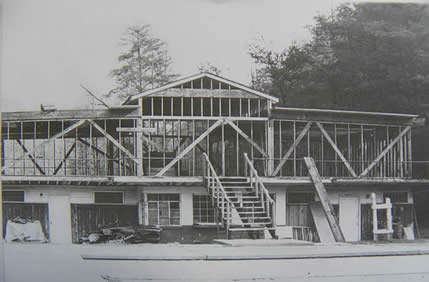 It’s been said that the only thing Appalachians have done longer than mine coal is grow food. The oral histories of this region will attest to that: The granny who canned all her harvest for winter in the canning house that still stands; the father who tended his garden all summer long, then saved seeds in an old envelope for next year; the mother who broke heirloom green beans to pressure cook and serve with a pone of cornbread. Our food ways are in our blood, as familiar to us as the mountains themselves. Our expertise in the ways of reaping all the land has to offer is unparalleled by many.
It’s been said that the only thing Appalachians have done longer than mine coal is grow food. The oral histories of this region will attest to that: The granny who canned all her harvest for winter in the canning house that still stands; the father who tended his garden all summer long, then saved seeds in an old envelope for next year; the mother who broke heirloom green beans to pressure cook and serve with a pone of cornbread. Our food ways are in our blood, as familiar to us as the mountains themselves. Our expertise in the ways of reaping all the land has to offer is unparalleled by many.
It only makes sense, then, that in this our time of economic renewal, we would look to these traditional food ways – passed from generation to generation – to carry us through to a new dawn of small-scale agriculture in Central Appalachia for the next generation’s benefit.
Stories from across the region about how that very thing is happening seem to be popping up every week. A big catalyst to this storytelling is the Kentucky Community Farm Alliance’s new communications effort, “Breaking Beans: The Appalachian Food Story Project.” The CFA blog gleans and grows stories about Appalachian people who have reconstituted the region’s rich food ways history and written new recipes for how to use it today.
The blog has celebrated the stories of many Appalachian farmers and of the burgeoning local foods scene that has cropped up in the region in recent years. One of those stories is about Joyce Pinson’s Friends of Drift Inn Farm, where Pinson and her husband Charlie raise Kentucky Bourbon Red turkeys – a nearly extinct breed. Her connection to Kentucky Bourbon Reds goes back generations to Civil War days when her family would board farmers herding their turkeys to market in Lexington in the family inn. She’s not breeding Bourbon Reds for the money; she’s reaching far back into the agricultural history of this region and pulling that history forward into modern day so it isn’t lost forever.
There’s also the story of two women in Perry County, Ky., who set a New Year’s resolution to create community gardens in Hazard, Ky., and actually stuck to it. Two years after making that resolution, Jenny Williams – an English professor at Hazard Community and Technical College – and Aly Cooper – a VISTA worker for Kentucky Mountain Health Alliance – have worked with their local community to harvest 750 pounds of food and donate it to several local food pantries/homeless shelters, clinics and daycare centers. Williams has seen a trend in her classes that less and less families were growing their own food. She hopes the community gardens can be a way for locals to relearn and carry on this Appalachian tradition as a way to improve the entire region.
When we talk about agriculture in eastern Kentucky and Central Appalachia, we aren’t talking about large-scale industrial farms like those in the Midwest. We’re mostly talking about heirloom crops grown from heirloom seeds, whose lineage, like that of the great queens and kings, can sometimes stretch back to before written records. Planting those seeds is touching the past; harvesting the food that grows from them is tasting what our ancestors tasted – it’s keeping their legacy alive in some small way. It’s also what has made Appalachia “the most diverse foodshed in the U.S., Canada and northern Mexico,” according to the Southern Seed Legacy Project. As testimony to that, the region contains 633 distinct varieties of apple and 485 distinct varieties of bean.
Farmers markets and Farm-To-School programs continue to blossom and grow across Central Appalachia, and as support for such efforts has multiplied time and time again, the economic viability of such endeavors becomes more and more clear. Such is the popularity of local foods in the region right now that the Appalachian Food Summit – which was started last year by a handful of Appalachian food enthusiast as a way to talk about the many varied and viable opportunities that local foods can create – will host a second annual summit this September.
We may not have a just transition Farmers Almanac to tell us under which signs to plant so that an economic transition the scale and size of which is necessary in these present times will bear the most fruit. But there are those still alive who can tell us under which sign to plant to produce the most yield from our crops, and who have envelopes full of hundreds-of-year-old shucky bean seeds, and who know the exact amount of vinegar to add to make one’s sour kraut turn out perfectly.
It is an eternally hopeful thing to grow food. There is no crystal ball that will predict what will come of the seeds you’ve planted. So, we plant blindly and unknowingly, unsure of whether tomorrow will bring frost or sun. We tend to the seeds we’ve laid in the soil of our fore growers – picking weeds and keeping crows at bay. And we wait. We wait for a future that will bear the fruits of our labor – a future in which we will reap what we’ve sowed, and we will take joy and pride in sharing it with our neighbors so that they may eat, too.
Our food ways have always sustained us – through hard winters and lean times. We may come from salt of the earth people without two pennies to rub together. We may live in one of the most economically depressed regions in this country. The jobs may be few and far between. But we Appalachians have always known how to feed each other and how to eat. Let us continue to replant the seeds of that knowledge now, so that someday we can take part in a bountiful harvest of a brighter economic future, ushered in my the assets of our past.





